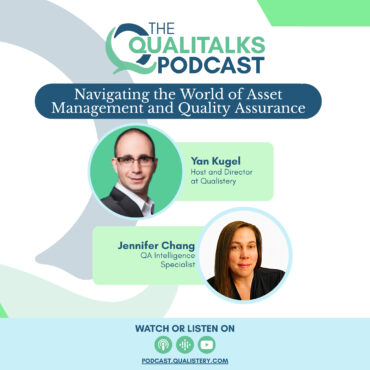
How Artificial and Automated Intelligence Change the Pharmaceutical Landscape
In this podcast episode, Christy Mazzarisi sheds light on artificial and automated intelligence in the Pharmaceutical GMP Industry.

 play_arrow
play_arrow
The Golden Rules of Hosting an Audit Àngels Llarch
In this podcast, Yan Kugel and our guest, Àngels Llarch, talk about how pharma companies should host external audits. Àngels shares some really insightful tips regarding hosting an audit, coming right from her 20 years of vast experience in the pharmaceutical industry.
Table of Contents
Currently working as API Compliance Head/Deputy RP at IMCD Switzerland AG, Àngels has more than two decades of solid experience, working in the Quality domain for several renowned pharmaceutical suppliers. She loves audits as they serve as a tool to discover new ways of implementing good manufacturing practices across the industry.
Audits are on-the-scene inspections of processes, quality systems, or finances of a company by an independent entity. This is done to ensure conformity between the set standards of a process and how it is being carried out in the organization under inspection. Simply put, an auditor examines whether a company is fulfilling necessary requirements and following set guidelines or not. Purposes of external audits include:
Although being a tool for improvement and learning, audits can actually lead to the opening of pandora’s boxes too. But this depends upon certain factors. For example, if your company’s quality management is compromised, then yes, audits will lead to the discovery. However, there are other things to consider as well. Sometimes making minor mistakes such as spontaneously or deliberately “inventing” things upon a sudden inquiry by the auditor can lead to a chain of uncovering questions, ultimately landing you in trouble. That happens when you fail to build trust with your auditor and replace it with doubts instead—implanting doubts, whether consciously or involuntarily, should be avoided. However, looking as a whole, audits primarily serve as great opportunities instead. Actually, that is the case most of the time. Why audits sound scary to many companies has its roots in our psychological inclination towards examinations. Exams sound scary and seem like they’re going to be troublesome. But without them, we cannot prove ourselves. Audits are similar. They open the doors to finding new ways of betterment and opportunities.
Àngels share valuable tips regarding hosting audits in our podcast. We’re summarizing it here.
Before the day arrives- prepare for it!
These two rules go along with each other in succession, one following the other:
During the inspection process, you are not supposed to describe everything that is happening at the scene. Things are right there in front of the auditor, and it is their job to inspect and question if needed. Many people make the mistake of speaking along unnecessarily during the audit. This is what creates a chance of opening the pandora’s boxes. Provide the auditor with an untroubled working environment. Only when they request you an answer, you have to speak. That is rule number one. If they don’t ask, don’t tell. And when they ask, only tell about what they ask. Try not to go an inch beyond. That is rule number two.
Building your credibility in the eyes of your external auditor is hands down the most precious achievement. That’s what Àngels Llarch says about trust in our podcast: “It takes a lot to build it up, and it’s very easy to knock it down.” How to build trust is a matter of being honest. Transparency and professional truthfulness are the keys to trust-building. There are many things in this regard that you can practically do. For example:
This way, becoming a facilitator of your auditor will help you a lot by building trust and confidence. Create ease for them and things will be easy for you as well.
Internal audits are a great tool to assess your company’s quality, performance, capabilities, and GMP compliance. If done right, they can constantly provide practical ideas for improvement in different work areas. Yan and Àngels talk about how departments give each other “medals” of highness after performing internal audits. This is a kind of the wrong approach. Internal audits are not meant solely for medals of appreciation. Instead, departments should be dedicated to improving each other. That is done by identifying potential problems through internal audits. However, making this list of problems is not the end step. And unfortunately, that is what many companies do. They make a list of problems and put them under the drawer. What you have to do instead, is to prioritize your observations and issues, make an agreement upon the observations between departments, and then opt for corrective actions. Prioritization increases efficiency by maintaining focus on one big problem at a time. Implementing corrective actions becomes much easier and effective using this method.
As Àngels says, the quality department should not be the only one that focuses on quality. After all, quality assurance and quality control cover the whole company. You must undertake active efforts to inculcate quality culture in every department, right down to every individual. That develops a capability in your company to ace any audit. And secondly, you have to do this during an audit as well. Involve as many departments as you can, not just the quality departments. This portrays coherence and outstanding communication among your departments, and it is likely to please the auditor. Representation from every department in an audit displays professionalism, as you are presenting your whole production team for crystal clear accountability, testing, and quality check.
Certain situations may be met during an audit where revealing, skipping, or stumbling at something might land you in trouble. Broadly this can be dealt with using two strategies.
Audits don’t happen all the time. Well, if you suppose that audits are happening all the time and fine-tune your organization to be always ready for one. What about that? This makes for a great approach towards dealing with audits and improving your quality altogether. In your day-to-day routine, adopt certain habits that an otherwise scary audit might not bother you. Always be audit-ready, and you’ll don’t have to worry about an audit ever again. Sounds great and is applicable too. But you have to work a little hard for this in the beginning. Inculcate this culture down to every individual of your organization and train them to be audit-ready. After a slight steep rise, the difficulty graph for your company will become flat, and things will become much more manageable.
Contrary to the common perception, audits are primarily a tool for improvement and not something to be worried about. This largely depends on how you deal with them. Àngels’s useful tips backed by her two decades of experience will be your premium guide in this regard. Learn the purpose of auditing, the importance of Good Manufacturing Practices, train your staff on these philosophies, and audits will never be a problem for you.
Information on good manufacturing practices (GMP) in the life science industry is scattered, vague and poorly organized. We have chosen to solve this problem by organizing the best possible GMP webinars and courses to ensure we deliver all the information you need in a concise, engaging and clear format. All events are free and open to anyone in the industry.
Browse Upcoming Free GMP Webinars
Are you tired of boring GMP training? Do slides full of the text put you to sleep?
Then start learning GMP with style with Qualistery!
Our training is engaging, fun, and highly effective!
[mailerlite_form form_id=1]
Tagged as: Audits, Audit Preperation, GMP, Quality.
Àngels is an API Compliance Head/Deputy RP at IMCD Switzerland AG. She has more than two decades of solid experience, working in the Quality domain for several renowned pharmaceutical suppliers. She loves audits as they serve as a tool to discover new ways of implementing good manufacturing practices across the industry.

Christy Mazzarisi May 16, 2021
In this podcast episode, Christy Mazzarisi sheds light on artificial and automated intelligence in the Pharmaceutical GMP Industry.


Copyright © 2023 Qualistery